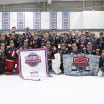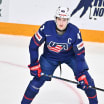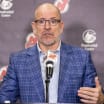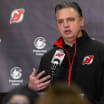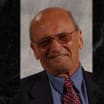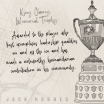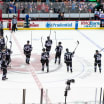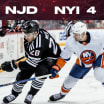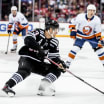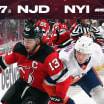If a song that best summarized the feelings of an estimated 60,000 fans who jammed the Meadowlands parking lot in 1995 it would be the classic: "I've Got Mixed Emotions."
I, personally, can vouch for that. I was there for the championship fete celebrating the Devils' first Stanley Cup victory. No question, the enormous crowd experienced both ecstasy and angst.
Covering the event for SportsChannel, which then carried the Devils games on TV, I felt those feelings; right to the core.
On that warm night in New Jersey, we celebrated the Stanley Cup triumph with all Devils heroes - from Conn Smythe Trophy-winner Claude Lemieux to Devils owner Dr. John McMullen - present and glowing.
The feelings of jubilation and coronation somewhat were dimmed by reality. Still to be dissipated was the black cloud of Nashville that hovered over the throng. There still was a chance the Devils would leave New Jersey for the Southland.
NO TO NASHVILLE was one of many placards being held by the fans. The champion players who spoke that night echoed the thought. Back-up goalie Chris Terreri, who had been the longest-running Devil, took the mic and urged, "Keep our team in New Jersey."
Planning for a Second Cup | SUNDAYS WITH STAN
The Devils sought to defend their 1995 Stanley Cup championship, but a hangover awaited
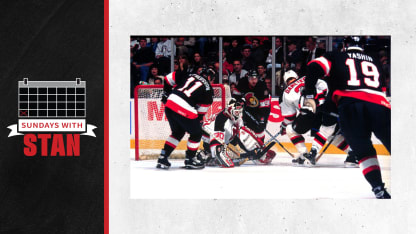
McMullen would later admit that he was visibly moved by the turnout's size and the fans' emotional response to his team.
"I'm a New Jersey native," Doc Mac responded, "and I want the team to stay right here; and I'll do my best to keep them right here in East Rutherford."
A man of his word, McMullen eventually struck a Devils-friendly pact with the New Jersey Sports and Exhibition Authority. Yes, as promised, the Garden State sextet would remain in the Garden State.
"Now," Doc Mac added, "it's up to Lou (Lamoriello) to bring us another Cup."
Not that the general manager had to be told. Just hours after his team had secured Lord Stanley's mug, Lou Lamoriello was well-ensconced in his office.
"There was work to be done," The Boss asserted, "and there was no point in resting on our laurels."
But, why not? Look at the lineup that brought victory to the Garden State:
Young Martin Brodeur was well on his way to becoming the winningest goalie in the NHL. His loyalty to Lou - and the franchise - was as secure as a champagne cork. Nobody would uncork Marty from the Devils.
Brodeur's defense was the envy of the league. The anchors were a pair of future Hall of Famers - Scott Stevens and Scott Niedermayer. Veterans Ken Daneyko and Bruce Driver were still approaching the acme of their long careers.
"We liked the look of our team," Dano, alias Mister Devil, asserted. "I mean, look what we did to Detroit. Four straight!"
Forwards such as Mister Clutch, John MacLean, hustling Bill Guerin and redoubtables like Sergei Brylin and The Crash Line of Bobby Holik, Randy McKay and Mike Peluso filled the offensive arsenal.
The bromide - if it ain't broke, don't fix it- seemed appropriate for front office thinking.
But Lamoriello knew his hockey history. He remembered reading about the legendary Jack Adams - as in Adams Award for best coach - and what happened to Jack's 1937 Detroit Red Wings.
The Motor City sextet had won two straight Cups and then - when it went after a Trifecta - Detroit missed the playoffs. "It was my fault," Adams sagely explained. "Instead of standing pat, I should have made trades."
Lou would not stand pat.
To the astonishment of practically everyone, he traded his playoffs MVP, Claude Lemieux, to the Colorado Avalanche. In return, the Devils received another kind of sharpshooter, Steve Thomas.
Additionally, Tom Chorske, a valuable utility forward, wound up being claimed off waivers by Ottawa. That seemed to be all the roster-tinkering that seemed necessary to maintain the Cup-winning corps of skaters.
"We got off to a good start," Guerin recalled, "and all seemed well."
A starting gate dash that produced four-straight victories would do that. But hockey history had already shown that there was such a thing as "Cup Hangover" and the summer between the Cup win and the next season was very short. Sports hangovers can last a long time.
"The thing with the Devils," says Vic Morren, ESPN's hockey researcher, author and all-round ice historian, "was that the hangover never appeared to abate. Sure, they started well but what followed were a half-dozen losing streaks of at least three games."
Former News 12 Emmy Award-winner and ex-NESN hockey producer George Falkowski had a similar view. Now current columnist-researcher for JAVA JIVE and The Fischler Report, Falkowski remembered:
"Maybe it was a Cup 'hangover,' but it also could have been that the Devils played down a level or two from what they had done in the previous regular season. The point is that they never really got it going. Just spurts."
Multi-award-winning broadcaster, Mike (Doc) Emrick, was doing play-by-play that fateful post-Cup season and detected a flaw in the Devils machine.
"They could not score," recalls Emrick. "On top of that, some players didn't have full seasons. I'm thinking of Petr Sykora, Sergei Brylin, Shawn Chambers, Brian Rolston and Bobby Holik; all important performers."
While New Jersey would finish the season as the NHL's least penalized team, the club also had the league's lowest shooting percentage.
It certainly wasn't Stevie Thomas' fault. The ace who replaced Claude Lemieux lived up to his notices. He played in 81 games, scored 26 goals with 35 assists for 61 points.
As a whole, the team scored only 215 goals, 19 fewer than Washington, the lowest scoring team in the East that season.
"Every so often they'd show a championship spurt," adds Morren. "They did go 7-0-3 between February 23 and March 15. But the offense sputtered in the homestretch."
Still, they remained in the race for the final playoff spot.
"It came down to the final weekend of the season," says Emrick. "And it seemed as if they still could make it."
Over their previous four games, New Jersey had won three. The make-or-break game was against the woeful Ottawa Senators on a Saturday afternoon at The Meadowlands.
Morren: "I was in a work trailer at ESPN that day. I remembered that the Senators were the only team with a lower-ranked offense in the Conference than the Devils. Ottawa had a 59-loss season.
"This was the perfect opportunity for New Jersey to save its season; sneak into the eighth spot and have a chance to defend The Cup. But the game turned out to be a microcosm of the entire season."
Lady Luck walked out on the Devils that day; replaced by Izzy Irony. And the most ironic aspect of all was ex-New Jersey forward Tom Chorske becoming the game's MVP - for Ottawa.
"Yeah," said Chorske after the game was over, "I had a lot of friends on the other side of the ice. But I was playing for the Senators and even though the game wouldn't mean that much to us; we still wanted to win."
For a while there was hope in the Devils camp. The defending champs nursed a 2-1 lead. The hero of '95, Brodeur, was in goal, but things just weren't the way they seemed they should be.
"They were flat as a pancake," Falkowski says. "It was hard to believe."
I felt the same way. Watching the game unfold, I never had a feeling of security; that the Devils would pull it off. They seemed off kilter. Their gyroscope wasn't right.
Sure enough, in a four-goal third period, chimp Ottawa played like champs. Ex-Devil, Chorske, scored twice including the insurance goal with less than three minutes left in the game.
Morren; "When the Senators added the fifth goal into the empty net, I felt that this scene was surreal. I was thinking, 'How could this team be the first defending champ to miss the playoffs in twenty-six years?'"
Post-mortems flew all over the place like pigeons out of a coop. Losing Claude Lemieux's scoring and dynamic personality was a recurring theme along with the post-championship hangover theory.
But it all equated with a bottom line; and a perfect song title to go with it:
"There'll Be Some Changes made."

